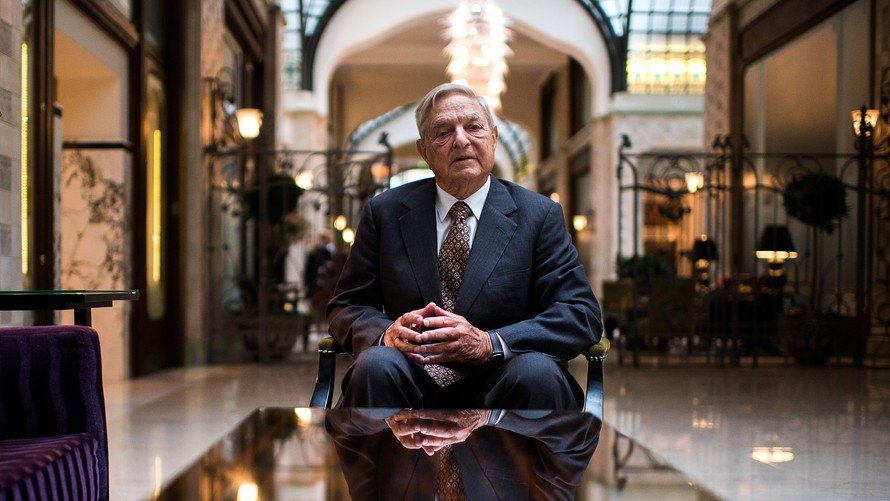Soros Fund Management Downsizes Caesars Entertainment Shares by 25 Percent, Formerly Owned Close to Five Percent of Gaming Operator
Posted on: May 17, 2019, 02:40h.
Last updated on: May 17, 2019, 02:45h.
As titans of the casino gaming and investment communities jostle to determine the fate of Caesars Entertainment Corp., big-name investor George Soros is reducing his stake in the casino operator.

Soros Fund Management, LLC, the family office founded by the 88-year-old billionaire investor, has decreased its exposure in Caesars. The investment fund trimmed its position by 25.15 percent, dropping to 24.82 million shares during the first quarter, according to a form 13F filing with the Securities and Exchange Commission (SEC).
Soros’s reduced Caesars investment comes amid a flurry of speculation about the future of the operator of nine Las Vegas Strip casino resorts.
Last year, Houston billionaire Tilman Fertitta offered to merge his Golden Nugget with the conglomerate, but that proposal was rebuffed. Fertitta, who also owns the Houston Rockets, is still looking for partners to make a bid for Caesars while Treasure Island owner Phil Ruffin recently confirmed his interest in the company as well.
Eldorado Resorts, a Nevada-based regional casino operator with 26 gaming venues from Reno to Atlantic City and across the Gulfport States and Midwest, has also been mulling an offer for Caesars, but is pushing for cost cuts. Caesars has given Eldorado a deadline of Monday, May 27 to make an acquisition proposal.
Murky Days Ahead
The uncertain future for Caesars could be one reason Soros Fund Management cut its ownership of the company’s shares. Upheaval within Soros’s investment fund may be another.
Former hedge fund manager Adam Fisher joined the company as chief investment officer (CIO) in mid 2017, but departed in February amid a spat with Dawn Fitzpatrick, who is the current CIO at the family office.
In her brief time at the helm of the $25 billion investment fund, Fitzpatrick has fired traders, pulled money from hedge funds Soros previously made allocations to, and made other sweeping changes in an effort to bolster returns.
It is also possible Soros’s position in Caesars was reduced so the firm could deploy capital to new investments. In the first quarter, the fund initiated 36 equity positions while boosting exposure in 30 stocks previously held by the firm.
Even with Soros’s pared-down Caesars position, shares of the casino operator remain the fund’s fourth-largest holding.
VICI Drop Down
During the first three months of the year, Soros also cut its stake in VICI Properties, Inc., a real estate investment trust (REIT) that owns 22 casinos, including Caesars Palace. Soros dropped its VICI investment by 6.03 percent down to 19.63 million shares. The REIT remains the family office’s second-largest equity position.
Spun off from Caesars Entertainment in 2017, VICI owns 1.2 million square feet of gaming space, 14,800 hotel rooms, and 150 bars, nightclubs, and restaurants. The company leases gaming and hotel space to casino and hospitality operators, with its primary clients being Caesars and Penn National Gaming.
The Form 13F revealing Soros’s sales of Caesars Entertainment and VICI shares does not detail the prices at which — or exactly when — the firm sold the stocks, but shares of both companies performed well in the first quarter. During the January through March period, shares of Caesars climbed 25.58 percent, while VICI added nearly 18 percent.
Soros Fund Management was previously structured as a traditional hedge fund, but was converted to a family office nearly eight years ago. Under the family office structure, money managers run investments for a wealthy family or families, meaning the number of clients and employees is typically lower than for a hedge fund.
Costs, regulatory issues, competition from cheaper investment strategies, and pressure from investors are among the reasons many hedge fund managers are opting for the family office vehicle. At the end of 2017, family offices had about $4 trillion in combined assets under management on a global basis.
What’s A 13F?
The Form 13F is the filing required by the SEC of money managers that have $100 million in assets or more on the last trading day of any month of the year. Those investors must file 13Fs 45 days following the last day of the year and 45 days after the end of the first, second, and third quarters.
Some market participants like to examine the 13Fs of big-name investors — such as Soros and Warren Buffett — for stock ideas, but it should be noted that 13Fs do not include a money manager’s short positions, cash on hand, or other asset classes held besides long equity holdings.
Related News Articles
Latin American Gaming Proves Massively Successful for Betsson
Most Popular
LOST VEGAS: ‘Tony The Ant’ Spilotro’s Circus Circus Gift Shop
Las Vegas Overstated F1 Race’s Vegas Impact — Report
Mega Millions Reportedly Mulling Substantial Ticket Price Increase
Las Vegas Strip Stabbing Near The Strat Leaves One Man Dead
Most Commented
-
End of the Line for Las Vegas Monorail
— April 5, 2024 — 90 Comments -
Mega Millions Reportedly Mulling Substantial Ticket Price Increase
— April 16, 2024 — 6 Comments -
Long Island Casino Opponents Love New York Licensing Delays
— March 27, 2024 — 5 Comments -
Sinclair Broadcast Group Selling 7.91 Million Bally’s Shares
— April 12, 2024 — 4 Comments
















No comments yet